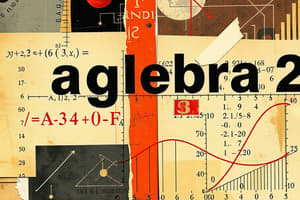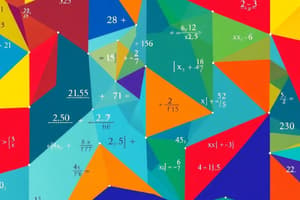Podcast
Questions and Answers
What does the branch of algebra commonly use to represent unknown values?
What does the branch of algebra commonly use to represent unknown values?
- Exponents
- Variables (correct)
- Sets
- Coefficients
Which mathematical branch is primarily concerned with the relationships between quantities, symbols, and operations?
Which mathematical branch is primarily concerned with the relationships between quantities, symbols, and operations?
- Algebra (correct)
- Decimals
- Statistics
- Fractions
In mathematics, which branch focuses on collecting, organizing, and interpreting numerical data?
In mathematics, which branch focuses on collecting, organizing, and interpreting numerical data?
- Algebra
- Decimals
- Fractions
- Statistics (correct)
What does statistics allow us to do with numerical data?
What does statistics allow us to do with numerical data?
Which mathematical concept involves repeated multiplication indicated by exponents?
Which mathematical concept involves repeated multiplication indicated by exponents?
What abstract objects in algebra allow us to describe and analyze patterns and relationships among data types?
What abstract objects in algebra allow us to describe and analyze patterns and relationships among data types?
What key statistical concepts help researchers draw conclusions based on observed data?
What key statistical concepts help researchers draw conclusions based on observed data?
In fractions, what does the numerator represent?
In fractions, what does the numerator represent?
Which type of number includes all fractions and integers?
Which type of number includes all fractions and integers?
What role do decimals play in simplifying calculations?
What role do decimals play in simplifying calculations?
How do fractions differ from decimals in representation?
How do fractions differ from decimals in representation?
What do rational numbers allow us to do in mathematical operations?
What do rational numbers allow us to do in mathematical operations?
Study Notes
Mathematics: An Overview of Algebra, Statistics, Fractions, Decimals, and Rational Numbers
Mathematics is a broad field that encompasses various branches, each with its own set of rules and principles. In this article, we will explore five key subtopics within mathematics: algebra, statistics, fractions, decimals, and rational numbers. These subjects form the foundation of many mathematical concepts and applications, from solving equations to analyzing data and understanding problem-solving techniques.
Algebra
Algebra is a branch of mathematics focused on the relationships between quantities, symbols, and the operations performed upon them. It involves manipulating expressions using rules of arithmetic to determine how changes in one quantity affect others. Some common elements of algebra include variables, which represent unknown values; coefficients, which indicate multiplication by certain constants; and exponents, which indicate repeated multiplication. Algebra also deals with abstract objects called sets and functions, which allow us to describe and analyze patterns and relationships among different types of data.
Statistics
Statistics is the science of collecting, organizing, analyzing, interpreting, and presenting numerical data. It allows us to identify trends, make predictions, and test hypotheses. Statistics play a central role in scientific investigation and evidence-based decision making across all areas of human endeavor, including politics, economics, medicine, and business. Key statistical concepts include sampling, probability, confidence intervals, hypothesis testing, and regression analysis. Statistical methods help researchers draw conclusions based on observed data rather than relying solely on intuition or opinion.
Fractions
Fractions are a fundamental part of our number system, allowing us to express quantities that cannot be represented as whole numbers. A fraction consists of two parts: a numerator and a denominator. The numerator represents the number of parts taken, while the denominator represents the total number of equal parts in the whole. Fractions can be used to compare proportions, find percentages, perform simple calculations involving distance, time, and weight, among other applications.
Decimals
Decimals are another way to represent fractions using a base ten number system. They consist of a whole number part followed by a decimal point and zero or more fraction parts. Decimals allow us to accurately express quantities that cannot be represented by integers alone, such as amounts of money, lengths, weights, and temperatures. They also help simplify calculations involving multiplication, division, addition, and subtraction of numbers with different unit values.
Rational Numbers
Rational numbers include all fractions and integers (positive, negative, and zero). They are so named because they can be expressed as the ratio of two integral numbers. Rational numbers play a crucial role in mathematical operations such as addition, subtraction, multiplication, division, square root extraction, and exponentiation. Understanding rational numbers forms the basis for understanding other types of numbers like irrational numbers and complex numbers.
In conclusion, mathematics encompasses a wide range of topics under several broad branches, including algebra, statistics, fractions, decimals, and rational numbers. These subjects form the foundation upon which many more advanced concepts are built, providing us with powerful tools for analyzing and understanding the world around us.
Studying That Suits You
Use AI to generate personalized quizzes and flashcards to suit your learning preferences.
Description
Explore the fundamental branches of mathematics like algebra, statistics, fractions, decimals, and rational numbers. Learn about manipulating expressions, interpreting data, expressing quantities, and working with ratios to build a solid mathematical foundation.




